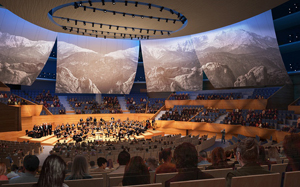The Colorado Symphony Orchestra says it wants to remain in Boettcher Concert Hall—after it’s renovated. In a Sept. 18 unveiling of the CSO's Boettcher proposal, Colorado Symphony CEO and board co-chair Jerome H. Kern presented a proposal for a repurposed, renovated concert hall. The plan envisions a modernized and upgraded building that allows for greater flexibility in programming and addresses critical issues of sound and structure.

Joined in the plan by members of the Colorado Symphony as well Denver business and cultural leaders, including Gil Boggs of the Colorado Ballet and Opera Colorado’s Greg Carpenter, Kern said the Colorado Symphony is ready to engage with the public as well as the city of Denver in a meaningful dialogue about the future of Boettcher Concert Hall.
“A great symphony, like a great sports team, needs a great field to play on,” Kern said. “Boettcher Concert Hall has been the Colorado Symphony’s home since it was built, and we’re optimistic that this plan allows us to move into the future, so that it can remain the orchestra’s home for another 35 years, at least.”
The plan was developed by Denver’s Semple Brown Architects, led by principal Chris Wineman. Semple Brown is noted for its work with performing arts venues, including the Ellie Caulkins Opera House, the renovation of the Helen Bonfils Theatre Complex lobby, the headquarters of the Colorado Ballet, the RedLine Art Center, Pueblo Memorial Hall, the Kenneth King Center, the Denver School of the Arts and Temple Hoyne Buell Theatre.
“Over the past 10 years, Semple Brown has studied Boettcher and compared it with both new and old symphonic halls, as well as the evaluations performed by multiple acoustical consultants during that time,” said Wineman. “Several lessons inform Semple Brown’s proposal for a renovation of Boettcher Concert Hall: the cubic volume of the hall needs to be reduced; the reflective surfaces closest to the musicians need to be larger in scale; the stage enclosure needs to be tighter; and the hall needs flexibility in seat count and seat format to help the CSO support a broader range of music types and performers,” Wineman said.
“On the basis of those lessons, Semple Brown’s conceptual design proposes two significant, yet cost-effective changes that work together to meet the four goals identified above, and do so in a cost-effective manner,” he added. “The design concept strategically adds seats close to the stage and reduces seating farther from the stage, while maintaining Boettcher’s distinctive intimacy and embrace of the musicians. It will allow the CSO to customize seating capacity quickly and easily to match its programming.”

Post a comment to this article
Report Abusive Comment